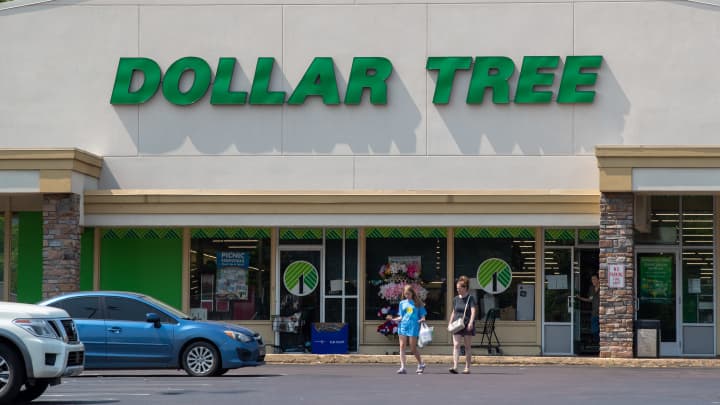
Shares of fell Thursday and hit a 52-week low, after the retailer said customers' shopping lists have largely narrowed to food and necessities.
The discounter joins a growing group of retailers catering to consumers who have become more price-sensitive and selective about spending. and also reported this week that as customers , as they deal with rising interest rates and juggling expenses like commuting, dining out and paying for more expensive groceries.
On a call with investors, Dollar Tree CEO Rick Dreiling said customers' shopping patterns reflect a tougher economic backdrop and a reversion to pre-pandemic spending habits.
"While the challenging macro environment continues to pressure our sales mix in both segments, I am pleased with the gains in traffic, new customers and market share," he said.
Dollar Tree, which includes its namesake banner and more grocery-focused Family Dollar, closed nearly 13% lower Thursday — even as it beat Wall Street's fiscal second-quarter expectations.
The company raised its full-year forecast for sales, but narrowed its outlook for earnings. Dollar Tree said the guidance reflects improved sales, and attributed the tighter profit range to more low-margin purchases such as food, ongoing challenges with shrink, the term used for lost, damaged or stolen goods, and higher diesel fuel costs.
Dollar Tree now expects consolidated net sales to range from $30.6 billion to $30.9 billion for the full fiscal year, and earnings per share to range from $5.78 to $6.08. It had previously forecast consolidated net sales of between $30.0 billion and $30.5 billion and diluted earnings per share of between $5.73 and $6.13. Dollar Tree's guidance disappointed Wall Street, as the lower end of its earnings forecast fell below consensus expectations.
Here's how the company did for the three-month period that ended July 29, compared with what Wall Street expected, based on a survey of analysts by Refinitiv:
Net income fell to $200.4 million, or 91 cents per share, from $359.9 million, or $1.61 per share, a year earlier.
Total revenue rose from $6.77 billion in the year-ago period.
Same-store sales climbed 6.9% across the company. At the Dollar Tree chain, same-store sales increased 7.8% and for Family Dollar, same-store sales rose 5.8% year over year.
Dollar Tree is in the middle of a broader effort to revamp its stores and its price points. Dreiling, former executive chairman of the company's board and ex-CEO of rival , has spearheaded the turnaround since he was named chief executive of Dollar Tree early this year.
The company has expanded its range of items to include more that sell for a higher price point, such as frozen and refrigerated items that sell for $3, $4 and $5.
During the second quarter, Dollar Tree's margins got hurt by shoppers' emphasis on buying food and essentials, which tend to be less profitable. Along with that spending shift, the company's profits have gotten squeezed by higher expenses including wage increases for store employees, investments in store repairs and bigger utility bills due to hotter summer weather in much of the country.
Its margins also decreased compared with the year-ago period when it phased in price hikes from $1 to $1.25.
More retailers have called out shrink as a challenge, too, as some thieves steal goods to sell on third-party marketplaces. On a call with investors, Dreiling said the retailer is rolling out new approaches to try to prevent theft in the back half of the year. Those efforts include moving and locking up some merchandise and even discontinuing some heavily targeted items.
At both chains, shoppers made more frequent trips to stores in the second quarter. The Dollar Tree chain saw a nearly 10% jump in traffic, but the average amount spent by customers who visited the stores dropped by 1.6%. At Family Dollar, traffic rose by about 3% and the average ticket increased by about 2%.
Separately, U.S. regulators this week with Dollar Tree and competitor Dollar General, which were both issued workplace safety violations. As part of the settlement, the retailers must fix hazards for employees, such as blocked exits and unsafe storage of materials.
In a statement, Dollar Tree COO Mike Creedon said the company is "implementing substantial safety policies, procedures, and training, all intended to safeguard the wellbeing of our associates."




